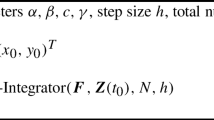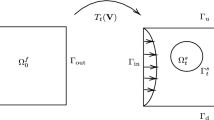Abstract
In a recent paper we proved a mesh-independence principle for Newton's method applied to stable and consistent discretizations of generalized equations. In this paper we introduce a new consistency condition which is easier to check in applications. Using this new condition we show that the mesh-independence principle holds for the Lagrange–Newton method applied to nonlinear optimal control problems with mixed control-state constraints and their discretizations by Euler's method or Ritz type methods.
Similar content being viewed by others
References
E.L. Allgower, K. Böhmer, F.A. Potra and W.C. Rheinboldt, A mesh–independence principle for operator equations and their discretizations, SIAM Journal Numerical Analysis 23 (1986) 160–169.
W. Alt, The Lagrange–Newton method for infinite–dimensional optimization problems, Numerical Functional Analysis and Optimization 11 (1990) 201–224.
W. Alt, Discretization and mesh–independence of Newton's method for generalized equations, in: Mathematical Programming with Data Perturbations V, ed. A.V. Fiacco, Lecture Notes in Pure and Applied Mathematics, Vol. 195 (Dekker, 1997) pp. 1–30.
W. Alt and K. Malanowski, The Lagrange–Newton method for nonlinear optimal control problems, Computational Optimization and Applications 2 (1993) 77–100.
W. Alt and K. Malanowski, The Lagrange–Newton method for state constrained optimal control problems, Computational Optimization and Applications 4 (1995) 217–239.
A.L. Dontchev, Perturbations, Approximations and Sensitivity Analysis of Optimal Control Systems, Lecture Notes in Control and Information Sciences, Vol. 52 (Springer, Berlin, 1983).
A.L. Dontchev and W.W. Hager, Lipschitz stability in nonlinear control and optimization, SIAM Journal Control and Optimization 31 (1993) 569–603.
U. Felgenhauer, Discretization of optimal control problems under stable optimality conditions, Habil. Thesis, Faculty of Mathematics, Technical University Cottbus (1999).
U. Felgenhauer, On Ritz type discretizations for optimal control problems, in: Proceedings of the 18th IFIP TC7 Conference on SystemsModelling and Optimization, eds. P. Kall, I. Lasiecka and M.P. Polis, Pitman Research Notes in Math. Ser. 396 (Addison–Wesley, Longman, 1999).
K. Malanowski, Convergence of approximations to nonlinear optimal control problems, Working Paper, Systems Research Institute, Polish Academy of Sciences (1995).
K. Malanowski, Stability and sensitivity analysis of solutions to nonlinear optimal control problems, Applied Mathematics and Optimization 32 (1995) 111–141.
K. Malanowski, C. Büskens and H. Maurer, Convergence of approximations to nonlinear optimal control problems, in: Mathematical Programming with Data Perturbations V, ed. A.V. Fiacco, Lecture Notes in Pure and Applied Mathematics, Vol. 195 (Dekker, 1997) pp. 253–284.
K. Malanowski and H. Maurer, Sensitivity analysis for parametric control problems with control–state constraints, Computational Optimization and Applications 5 (1996) 253–283.
S.M. Robinson, Strongly regular generalized equations, Mathematics of Operations Research 5 (1980) 43–62.
Author information
Authors and Affiliations
Rights and permissions
About this article
Cite this article
Alt, W. Mesh-Independence of the Lagrange–Newton Method for Nonlinear Optimal Control Problems and their Discretizations. Annals of Operations Research 101, 101–117 (2001). https://doi.org/10.1023/A:1010912305365
Issue Date:
DOI: https://doi.org/10.1023/A:1010912305365




